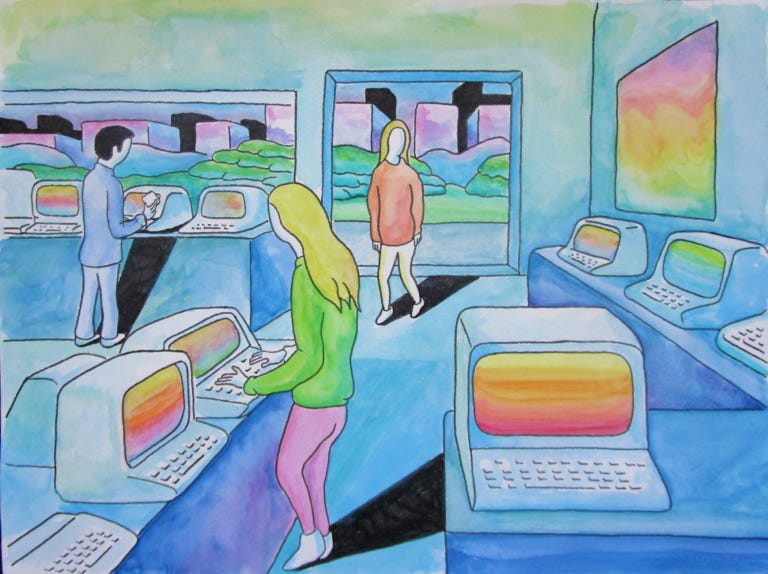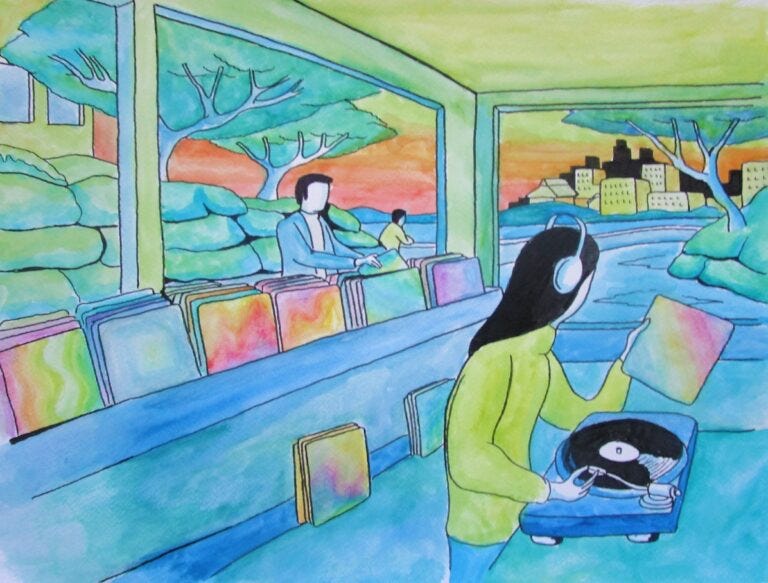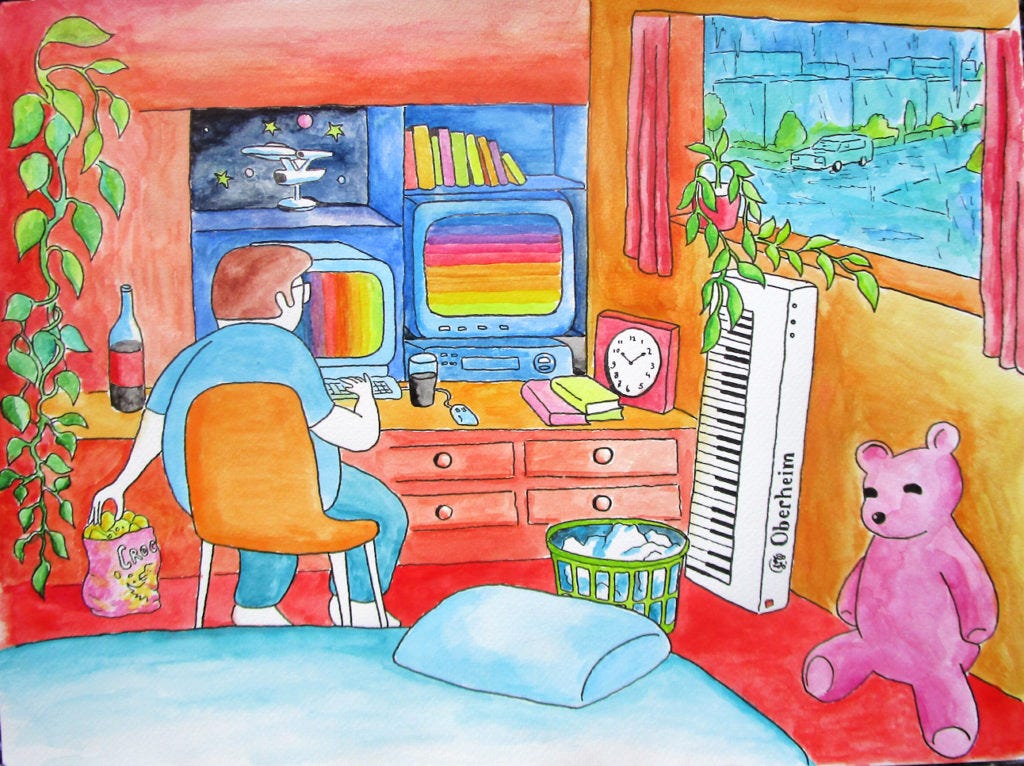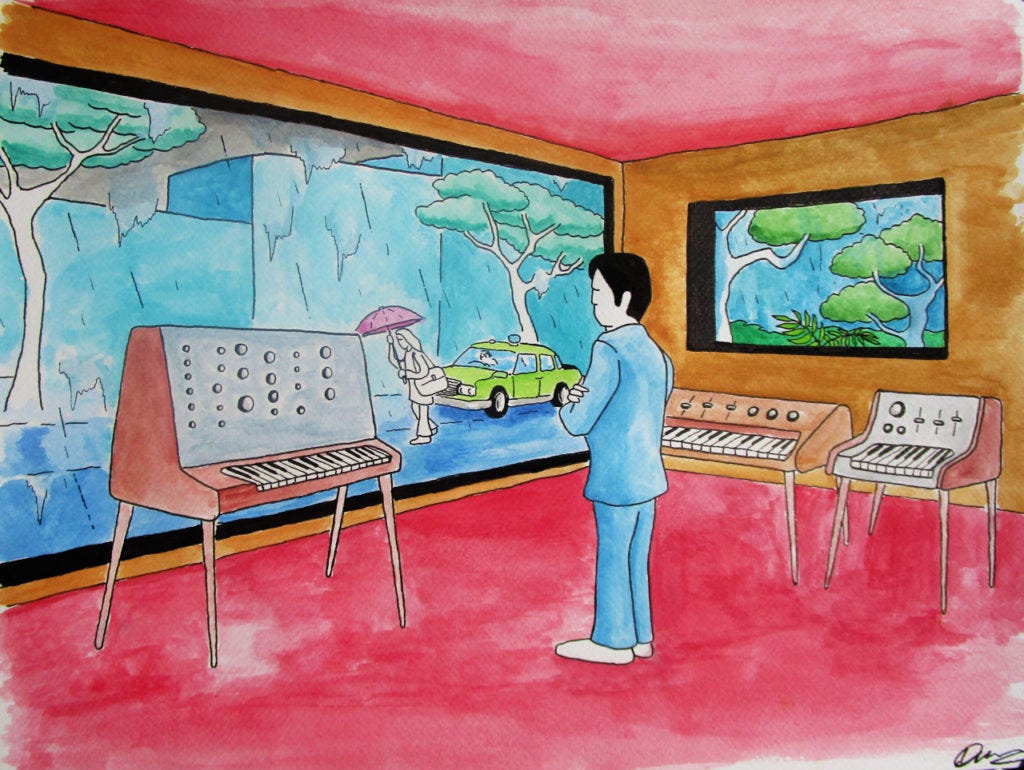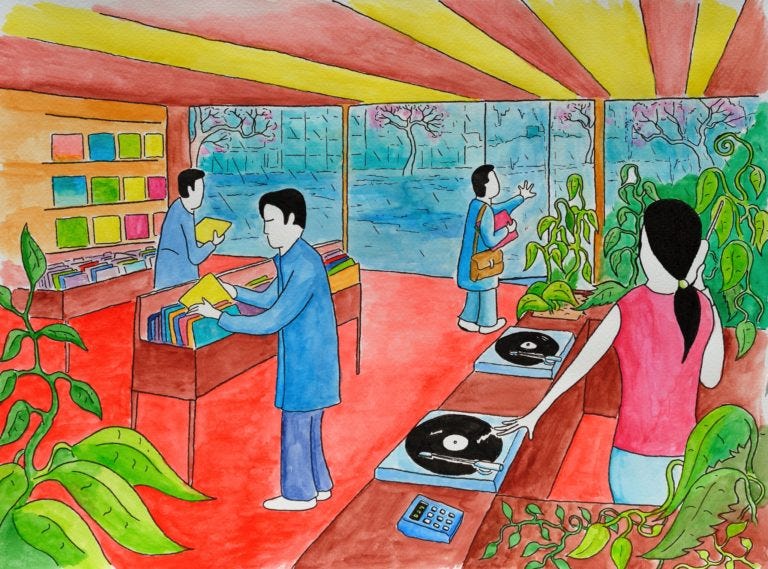A Criticism of Danny Wolfers
The meaningless expression of cartoons through kitsch aesthetics, nostalgia, and feelgood consumption
Danny Wolfers is a Dutch musician, artist, animator, DJ, and writer known under his brand name “Legowelt.” His first release was in 1996, and soon after, he has released a a number of quirky album titles, including “Amiga Railroad Adventures,” “Loch Ness,” “Tips for Life,” and “Pancakes After Mist.”
At first glance, his electronic music and cartoons are playful, funny, and even interesting at times. However, Wolfers’ art falls short into novelty, redundancy, pretension, and deep inauthenticity, emulating the work of Thomas Kinkade but in the year of 2023.
Why would such a harmless artist incite such feelings of dismay?
Wolfers is a reflection of the current state of the electronic musician, with his obsession around authenticity, and the estranged pursuit of many hobbies without context.
The bourgeoisie have one thing in common, and that is they have an unlimited amount of free time of expression, production, and consumption. Profit is not a concern, because the bourgeoisie rely on the trust fund money they have access to and what they could spend it on. For Wolfers, being a travelling DJ simply does not equate to the living cost of his overabundant and expensive synthesizer collection, ranging close to a million dollars, and then somehow, changes hobbies immediately without repercussions of the cost spent on the hobby verse profit, …if any is made.
I’ll spare the details about Wolfers’ personal life, but I believe he suffers from petite bourgeois emulation and a derangement of extreme consumerism. He is a niche version of the bearded soyboy who collects Funko Pop dolls.
Ownership of property does not equate to authenticity or knowledge whatsoever. The equivalent could be said about a “book collector” who merely organizes books by colors, but could be careless about the books in poession, or just not interested in reading the deeper context inside. The ownership of books rather means something through subculture, and validates the hobbyist as a professional or a complex intellectual, when in reality, this is a misnomer. It’s a façade to cover up the fact that the person is a excessive consumer, a member of the petite bourgeois class that uses capital to express power over the poor, and tries to mimic the behavior of the (then) elite that once held the traditions that the consumer so desires.
Back in the 1980s, black people in Chicago and Detroit use to make electronic music. In 2023, a Dutch person is trying to resurrect a culture that doesn’t exist anymore. And was Wolfers really an associate of an actual subcultural scene? Or is this rather just ironic postering and novelty worship over consumer objects? Wolfers exhibits much of the latter. Being a “DJ” means playing other people’s records, while assuming that the listener understands that you must have “a good taste in music,” and you representing a sincere, “underground” vibe. …And that’s what we are suppose to believe with Wolfers?
Instead of diving into his offbeat and nonsensical music, it’s best to look at his cartoons, or art, that has influence from Peter Max and the psychedelic nature of the 1960s. I been interested in this aesthetic too, and have incorporated Wolfers’ aesthetic into my own work, “Ludism: Board Games That Will Get You High.” Wolfers reflects back onto my own art, and makes me understand why would I think of band names like “Pizza Dog Studios” or “King Trode” in a playful and ironic sense. Much of Wolfers’ work is a reflection of the millennial generation and it’s own bourgeois escapism to try and find the “hyperpop” and experimental nature of Rhode Island’s Fort Thunder.
To understand what a fan thinks of Wolfers, consider what a user by the name of “SemaSober” wrote on his Discogs page, published January 8th, 2021:
“What I really love about Danny Wolfers is that he is able to be (and stay) his authentic self, both as a person as well as musician / producer / artist, and this is very well visible and reflected in his music (and don't forget his drawings & website!). In an age were more and more people are starting to look the same, act the same, and create the same (basically the same on all aspects of life) Danny is able to just keep on doing it's thing without getting sucked into or being tempted by trends, fame or money...
I find this extremely inspiring and as an artist myself I understand this kind of mindset. These sort of people are so rare nowadays and we should cherish and respect those people, and support them if you like what they are doing, of course!
Even though his sound is not necessary what I listen to too much when I listen to electronic music, I still dare to call myself a 'fan' of Danny... simple because he's authentic!
…“Authentic?” And 14 users found this comment helpful? This is the most misleading and misunderstood comment about Wolfers. SemaSober does not understand what “authenticity” really means and is likely coming from a bias or poor understanding that an interest in material hobbies and collecting is somehow a point of subcultural authenticity. One is simply not authentic if it means becoming a supposed renaissance man and juggling a bunch of “content creation” activities until something sticks that makes money. Otherwise, Wolfers has a huge disposable income from a rich Dutch family. Average people with 40 hour jobs and dependent income cannot do this. Wolfers is rather a reflection of the common consumer and the mislead liberal “artist” of 2023.
I would argue and say that Wolfers is chasing after fashion trends! And pretty much is like everyone else! How so? The Polyend company released a Wolfers’ version of their “Tracker” sampler, featuring Wolfers’ art on it. I even own it, and have access to Wolfers’ songs and samples. Tracker is a simulacrum of an Amiga 500, and presented as a boutique hipster toy for collectors. Obviously he we pursing money in this, SemaSober. I already expressed my concern with Polyend and their pursuit of inauthentic electronic music before.
Wolfers is obsessed with a nostalgic trip of his own childhood past, or a “lost future” he cannot have access to. He can only dream it in the same way Mark Fisher wrote about in “Acid Communism.” I only bring this Fisherian terminology up is because I too went down this same cliché path in art school, and I clearly see my own mistakes and zeitgeist reflection of following cultural and dead-end intellectual trends, and this is further projected in the work of Danny Wolfers.
Let’s take a look at a few examples of his art:
A faceless woman is playing on a Korg MS-20 clone in the forest, near a car and house. It is a common trend in the “gear review” community to play their synthesizers and drum machines near plants, likely an influence from the album, Mort Garson’s Mother Earth’s Plantasia.
Like Mark Rothko, Wolfers is obsessed with rainbow as a single color. The computer and plants is a reoccurring theme.
Wolfers’ interest in technology also comes from a love for the Japanese, hence the shinkansen and faceless “Asians.”
The people could be “omni-racial,” but all have the face of nothing and the obedience towards it’s technological parent, exactly like the Asian spirit. The “organic” can co-exist with the “non-humankind.” An understanding of Timothy Morton and Object-Oriented Ontology is prevalent here.
A Eurasian futurism between Europeans and Japanese exist in this piece, as both are taking a Japanese bus into the forest. Both groups use technology to improve upon their lives.
The physical “market” exists here. Wolfers is expressing a nostalgic trip about the yard sale in “nature,” and how objects mean something to people. Like Thomas Kinkade who draws cabins in the forest, Wolfers feels good about drawling hypothetical situations where he can buy things as a consumer.
Here's another market of rainbow computers. The “store” itself becomes a temple, or a place of hospitality and inspiration. Consumption is the mood, like masturbation.
I’m not sure if this is a joke on the band Heaven 17, but the corporate love of profit, as shown on the calculator, is likely a feelgood value from Wolfers.
Collecting vinyl records and window shopping, exactly like in the past, or practiced by a 1990s DJ “looking for samples or dance rifts,” itself a lost future. The faceless Asians appear again. Notice the bonsai trees. Again, an existential crisis about identity and trying to find “authenticity” through subculture, itself an act of Heideggerian inauthenticity. This is a projection upon Japanese people acting a certain way.
The clash of the European and the Japanese happens again. Here, a “black metal” band of Eurocentric origin is at an airport in Japan. Why would the Japanese be interested in such music? I believe it has to do with The Group of Seven, or G7, that colonizes countries to practice neoliberal capitalism and to spread values of whiteness. Japan is unfortunately apart of G7.
Sometimes, the European people worship the Japanese because they have an alliance with America and capitalism. Thus Wolfers interest in the Japanese is only a reflection of his own love for profit, consumption, and commodity fetishism, where “the good Asians” advocate these American values. The Japanese produce the things Americans want.
This piece is a worship of the country of Japan, of course at the expense that Korea, China, Vietnam, Singapore, or Thailand is “not cool,” or belong outside the realm of capitalism, or anti-capitalism, while all advocating some hostility towards globalism. The Japanese were colonized, and thus have to worship American imperialism and European interest.
A “LARPer” is someone who plays a game of “live action roleplaying.” Originally coined in the Larry Niven and Steven Barnes' 1981 novel Dream Park, the LARPing hobby has since became an absurd act of theater and novelty. Here, the characters play a role outside of themselves. Perhaps Wolfers is playing a character too. Subculture means you put on a costume. Possibly playing the game of the “DJ” or a “electronic musician.”
A hobby is a leisure activity, done as a form of pleasure. The petite bourgeoise try and emulate the mode of production of an “artist” they learned through mimicry. In this piece, a woman (a desired object), is messing around with vinyl records, sampling them as the pursuit, while expensive synthesizers are around the house, with plants and cat, as it snows outside. She is having fun indoors. In this dream world, one has to understand where money is coming from, and how it can buy these things which do not correlate with income. This piece by Wolfers has to be the most similar to Kinkade.
And this one is named, “Genesis of a New Hobby.” Stated clearly here, Wolfers is not shameful when it comes to the joy of consumption.
And here, a man is “waling home with a plan.” …Did he just eat at McDonalds? And where is his middle class income coming from? What does he do for a living? And why would he assume that music making can churn a profit in return?
…That’s right. He works at McDonald’s. Because that lower-middle class income is going towards a $800 Akai S900 sampler, and not rent! A private-sector capitalism that makes everyone with unibrow faces depressed.
While I could go on about Wolfers’ misunderstanding of how an Amiga works, he has an interest in OctaMED “3,” not 4. OctaMED can create songs with greater tracks and send midi, but is not widely available for the .mod format, as that is for ProTracker. Wolfers’ own album, “Amiga 500 Tapes,” is not made on an Amiga 500 or on ProTracker, and the album itself is entirely misleading. This clearly shows Wolfers as a pretentious hipster.
This hipster attitude is personified in this piece, “Acquiring Information Before the Internet.” Wolfers has never contributed songs in the .mod format, or on The Mod Achieve, and he only appeared in popular music around 2009, way past when I Created Disco by Calvin Harris was released in the irony age of 2007. Wolfers only uses the Amiga as a sequencer under this influence as a means of “authenticity.” He’s nothing like Andrew Sega, or Necros, creating demoscene art in the 1990s.
Here, the fat man is shamelessly eating potato chips, like a soyboy, and consuming.
Another “Japanese” man presented here.
More “Japanese people” doing the right, Eurocentric things. “Wow, they must like interesting stuff!”
The interest in toy trains is another quirky theme by Wolfers. The assumption is that a bizarre hobby, like building toy trains and creating a landscape for them, can be also absurd and “nerdy,” like collecting synthesizers and producing noise.
…And so forth. This a good survey of Wolfers’ “art” in question.
In his last ditch effort after producing music without care or traveling as a bum DJ, Wolfers decided to act upon animation, and combined his art into a moving picture show.
Here he is, “animating,”
His first animated movie can be described as,
[AMBIENT TRIP COMMANDER is] the story of Samantha Tapfersten, a geeky young woman who lives a rather dull life in a medium-sized European city. She works a mundane job at a synthesizer store and spends her lonely evenings playing RPG games. One day she receives a cryptic email from a hacker group inviting her to Lonetal, a village secluded somewhere deep in the European Alps. As we follow her journey to Lonetal, things become more sinister and a grand mystery starts to unfold…
At this is point, it is safe to say that the medium of writing is the most superior artform.
Cartoons, music, and performance can only go so far as to rely on aesthetics and subjective meanings from the fleeting viewer. These mediums in question rely on the logic and intellect of written thoughts in order to communicate an idea. Unfortunately, aesthetics fall short of sophisticated thought processes and intimacy, as shallowness and image becomes the priority. This is often confused as a form of beauty or sincere intellectualism, when in reality, it is animalistic emulation and mimicry.
Wolfers written word, and in accordance to the picture show of Jim Woodring, can only describe the same mundane hobbies and bad pleasures Wolfers suffers from. The obsession of the woman as the protagonist could be a reflection of his own sexuality, his desire for someone unimageable like him, or his yearning to be desired as a woman (that subculture and material gain could represent). The class analysis of working for a useless private sector, like “a synthesizer store,” is also a reflection of what happens during her free time, “playing RPGs,” thus escaping reality. The stereotypical female fantasy of Fabio Lanzoni resecuring her is apparent here, but let it be an authentic group of BBS “hackers” that Wolfers wished happened to be apart of. The Joseph Campbell display of The Hero’s Journey becomes all too repugnant. Nothing original is ever said or done. We just have to watch these “animated” cartoons and suffer a sound collage of expensive modular Euroracks going nowhere.
I really don’t know what’s worse in 2023. The utterly played out poser music of power electronics, or the cutesy and ironic noise of Danny Wolfers.
I don’t think Danny Wolfers will be remember as “the next big thing,” like he’s next in line after Daft Punk. Far from it. His attitude and behavior is all too common with the petite bourgeois and post-millennial generation in an age of a post-capitalist, post-scarcity economic society. Electronic music is manifested as a “show and tell,” “look what I can do with this expensive toy” meandering. A similar act by the name of Aaron Funk fell by this wayside and went in debt through buying too many synthesizers and music equipment. And Funk was manifesting the art of Trevor Brown, “avant-garde hate,” and power electronics before electronic music took and turn for the worse and became a bunch of rich European kids celebrating a past that they never got to experience. Oh well.
Now some idiot on YouTube is telling me that my “synthesizer is trans” without peeping a word about Timothy Morton. What is Red Means Recording’s argument in question? “The trans agenda is literally just making cool shit and being cool.” If that’s the concern, than being “cool” is more important than being authentic. What is “cool” will constitute to poor consumer choices, Malthusian social control, and bad values to role model. This isn’t about synthesizers anymore!
And like Danny Wolfers, the so-called “community” of electronic music making is another cash grab to lead people off a cliff, just like what they did to board gaming, and whatever capitalism touches.
Wolfers acts upon feelgood emotions because that’s what gives him joy in return. To simply draw a picture and emulate a vision, chemicals are released in the brain, so “the artist” in question does the same activity again. The hobby itself is like watching porn, where porn is watched solely for the act of masturbation, and the creation of it requires ejaculation too. If this constitutes as ‘beauty,” what’s stopping someone from being a “stoner” (as a subcultural name) or an avid drug user? Maybe lifting weights does create muscles in the body, but eventually the bodybuilder becomes a homosexual if he relies too much on the activity. We would we ever take pride in our own sedation? I’m sure that’s what powerful people want. They want us subdued and passive so we can’t express ourselves in our own mediums.
The medium becomes pornographic.
I digress. But this is the truth about Danny Wolfers, and why his art, although ambiguous and excessive, fails to connect at any higher intellectual level. Wolfers creates an edible product, which is consumed by the consumer, and consumed by himself. I learned about my own previous artistic mistakes through the work of Danny Wolfers, making sure I won’t repeat what he has done, in style, aesthetics, and discipline.
I pursue the truth. Or as Ben Shapiro might say, “facts, not feelings.”
-pe
6/20/2023
P.S: As of 7/25/2023, a Wolfers “fan” by the name of “Phylopn” recently called this criticism of mine, “insane nonsense.” I have yet to hear his rebuttal and counter-argument, on why my criticism of Danny Wolfers is somehow "insane nonsense.” Where is the evidence that Wolfers is not the things I found critical of? ...But I doubt it. Considering he does not have a blog, or actually thought about the common things in front of him, drowning in the consumer subculture he is invested in. I guess my objective concerns written here are “insane nonsense” not worth questioning. This proves the cult cannot criticize itself, and thus validates my argument as more important than anything. -pe















